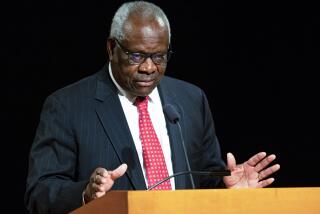Kept Haphazard Records, Claiborne Tells Impeachment Panel : Judge Says He Was Careless, Not Greedy
- Share via
WASHINGTON — U.S. District Judge Harry E. Claiborne acknowledged at his Senate impeachment hearing Monday that he had only “a haphazard system” for keeping records of money he received in deferred legal fees, a practice that led to his income tax evasion conviction.
But Claiborne, in his second day on the stand, maintained that he should not be removed from his post as a federal judge in Las Vegas because, he said, he did not willfully violate U.S. tax laws. “I plead guilty to being careless in my own personal business,” Claiborne testified.
Relied on Accountants
As proceedings before a special 12-member impeachment panel neared conclusion, possibly by today, the 69-year-old jurist contended that he had relied too much on accountants who prepared his 1979 and 1980 income tax returns. Claiborne was convicted of underreporting his income for those two years by more than $106,000.
Although he went to jail last May, Claiborne is facing impeachment--the first such Senate proceeding in 50 years--because he has refused to resign from his $78,700-a-year judgeship, a lifetime appointment. He is the first sitting federal judge in history to be imprisoned for crimes committed while on the bench.
Under cross-examination by Nicholas Chabraja, who was appointed as prosecutor by the House, Claiborne said that he had failed to note a tax preparer’s error that listed him as receiving $22,300 for 1979 in legal fees performed as a private attorney in previous years. The judge testified that the correct figure should have been at least $41,000, nearly twice the reported amount.
Signed Blank Returns
“I often signed blank returns over the years,” Claiborne said. “I never should have been as careless with my returns as I was.”
When asked by Chabraja if he was motivated by “sheer greed,” Claiborne replied in a choked voice: “No, of course not. There is not one thing in my personal or professional life that would indicate I am a greedy man.”
Claiborne acknowledged that, after he became a judge, he lost precise count of some checks he had received in deferred legal fees because he often cashed them in Las Vegas casinos rather than depositing them in his bank account, which had been his practice earlier.
He said he needed large sums of cash to pay transient laborers who were remodeling his home and denied government allegations that he had been trying to conceal some of his income.
Whose Responsibility?
Another witness, tax accountant Jerry Watson, was asked by Sen. Howell Heflin (D-Ala.) whether he or Claiborne bore ultimate responsibility for the other tax return in question, for 1980.
“The final responsibility rests with the taxpayer,” Watson replied. “But this should not have been a criminal matter. This was a regrettable error, but it should have been handled by the Internal Revenue Service through a civil audit proceeding, which would have resulted in Judge Claiborne paying additional taxes plus a 5% negligence penalty.”
Claiborne has charged that his income tax mistakes were exploited by federal law enforcement agents in Nevada, who he said had been seeking to discredit him.
More to Read
Get the L.A. Times Politics newsletter
Deeply reported insights into legislation, politics and policy from Sacramento, Washington and beyond. In your inbox twice per week.
You may occasionally receive promotional content from the Los Angeles Times.










